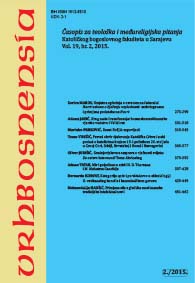Srednjovjekovne rasprave o vječnosti svijeta: De aeternitate mundi Tome Akvinskog
Medieval Discussion on the Question of the Eternity of the World: Thomas Aquinas' Work De aeternitate mundi
Author(s): Oliver JurišićSubject(s): Christian Theology and Religion, Metaphysics, Philosophy of Middle Ages
Published by: Katolički bogoslovni fakultet
Keywords: Thomas Aquinas; Bonaventure; john Pecham; aeviternitas; aeternitas; metaphysical approach;
Summary/Abstract: The aim of this article is to give an overview of discussion about the eternity of the world in the short work of Thomas Aquinas entitled De aeternitate mundi. With the discovery of Aristotle's philosophy, the eternity of the world became an important philosophical question in medieval thought. With translations and the commentaries of the Arabic philosophers Avicenna and Averroes on Aristotle, controversy began over personal immortality as well as over the eternity of the world. This ultimately led the Bishop of Paris, Stephen Tempier, in 1270 to condemn some of the theses being taught at Paris University. It was in the same year exactly that Aquinas' short work is known to have been published. De aeternitate mundi is believed to have been Aquinas' response to his opponents, Bonaventure and john Pecham. The opening section of the article briefly reviews the context in which the work was written as well as certain terminological differences regarding notions of time. After reviewing the context the author introduces scholarly opinions regarding the date of publication of the work. With a few exceptions, most scholars believe that Aquinas wrote De aeternitate mundi during 1270. Since some scholars classify Bonaventure and john Pecham as Aquinas' opponents, the article introduces the positions of both authors regarding the eternity of the world. It then introduces Aquinas' position through a survey of some of his works. Finally, the article introduces the main arguments of Aquinas in De aeternitate mundi making the case that Aquinas took a metaphysical approach to the eternity of the world and in addition that he argued for the aeviternitas of the world, not aeternitas, which is the term used specifically for God's eternity. In this sense Aquinas differs from his opponents. The article concludes with some observations on the relationship be- tween faith and reason and the actuality of Thomistic philosophy for a scientific view of the world.
Journal: Vrhbosnensia
- Issue Year: 2015
- Issue No: 2
- Page Range: 379-395
- Page Count: 17
- Language: Croatian

